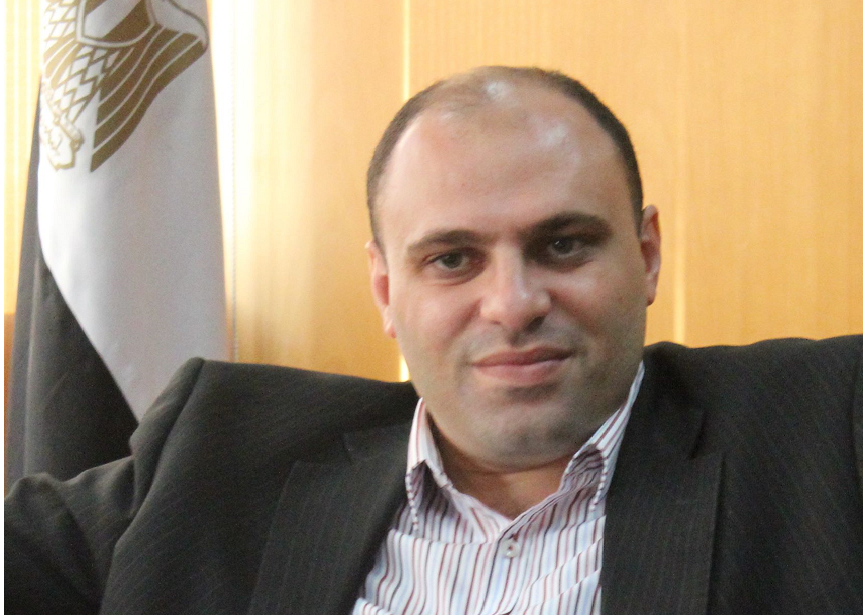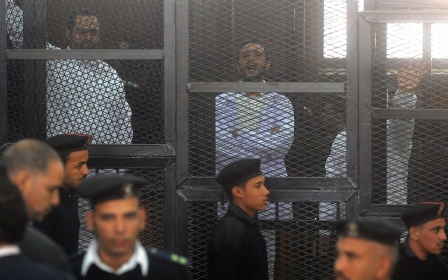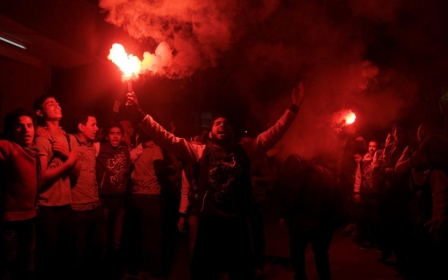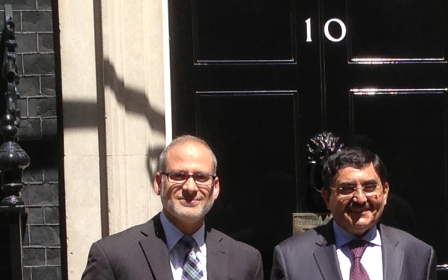INTERVIEW: Former Egyptian investment minister Yehia Hamed

I meet Yehia Hamed at a crowded restaurant in Istanbul’s old quarter of Fatih. On the European side of the Bosphorus, this neighbourhood, known for its religiously conservative community, has become a hub for Syrian migrants and exiled Egyptian Islamists who, like Hamed, now speak Turkish.
Near the restaurant, a group of young Syrian men in tracksuits sit on wooden chairs drinking tea and speaking in Arabic. The smell of warm lahmacun, a thin mince-meat pastry, wafts from inside.
Hamed arrives in a rush after trying to park his car on the bustling road. The 36-year-old, with broad-shoulders and a round face, was one of the first and only Islamist politicians to serve in an Egyptian government.
Before Mohamed Morsi was overthrown by the military in July 2013, he served as the country’s investment minister and also acted as one of six close Morsi aides, most of whom were under the age of 40. Today, Hamed is seen as a leading figure in the Brotherhood’s more youthful, reformist wing.
With a smile, Hamed shows me to a table. Tall and charismatic, he speaks with the confidence and positivity of a newly-elected leader – or at least one still in power - despite the fact that some might say his attitude is surprising given that the Brotherhood, its leaders scattered in exile to capitals across the globe after a violent crackdown launched against the group, is seeing some of its darkest days.
Hamed has landed in Istanbul where he lives on the outskirts of the city with his wife and three children. In Turkish, he calls a waiter to our table, and, minutes later, lentil soup, kebab and eggplant arrive.
After studying English and French as an undergraduate in Cairo, Hamed worked as a senior sales manager at Vodafone as well as a consultant for firms in Saudi Arabia, Jordan and Yemen. He joined the Brotherhood in the early 2000s and became involved in its political wing after the 2011 uprisings.
Young members of the Brotherhood describe Hamed as a breath of fresh air amongst an ageing leadership. “He's clear and to the point. He may bring some change,” 23-year-old Brotherhood member Mostafa el-Nemr tells me.
With hundreds of the Brotherhood members behind bars in Egypt, the group is at a critical juncture and the spotlight is increasingly on politicians like Hamed. Analysts say the party is facing two challenges: an exterior battle as it tries to fend off attacks from the government of Abdul Fattah al-Sisi and an internal struggle, as it wrestles with growing dissent and frustration from within its ranks, especially among the youth.
Rebellious voices have existed within the Brotherhood for decades, but in the last four years these voices have grown louder. Many young people have left the organisation because of disagreements over the Brotherhood’s internal management and Egypt’s revolutionary trajectory. Some, like Hamed, remained and are trying to bring about a “radical new approach for change within”.
Hamed says the group’s leadership has already responded to calls.
“The new leaders on the ground in Egypt are like you…in their twenties,” Hamed tells me.
Other members, however, say the jostling between the young and old, and the revolutionaries and the gradual reformist members of the Brotherhood continues.
MEE: What are the objectives of the Muslim Brotherhood at the moment? Has the strategy changed after a year and a half of the coup?
Yehia Hamed: I will explain my goals by stating how I think Egypt should be. The coup is not about Sisi, it is about a whole system that has been enslaving the Egyptian people. Egypt is not a country that is being served by an army, it is an army that is being served by a country. When we say in the constitution – the people are the source of power [legitimacy]. The situation is not so in Egypt. The people are not the ones who give legitimacy to governmental bodies and institutions. Thirty percent of the people are under the poverty line, more than 25 percent are illiterate, and there is almost no engagement of the youth and women. We want an Egypt where the people can question the army about its budget and expenditures, about the economy and the support it is receiving from the Gulf.
MEE: What are the lessons learned during the past year and a half and during the time when President Morsi was in power?
YH: In terms of the quest for freedom it is too early to assess what was right or wrong. Some people are always examining this success against the final result – the falling of the coup. But if the criteria are the awakening of the society, the clarity of our strategy and our political, economic and social capabilities, let me assure you we are on track.
Here, I am referring to the masses as a whole and not just the Muslim Brotherhood. There were 16 million people on the streets, just normal people, who revolted against the system. Those people got fed up of both camps, the MB and the army, and they visualised the scene as a fight over power. This was one of the mistakes we made, we kept it in the people’s minds that we [Muslim Brotherhood] will fight on their behalf. Instead we should have been engaging the masses into the revolution because they are its owners. We should not have considered ourselves as their representatives; it is about the collective action and mind. That was a lesson learned.
MEE: How do you evaluate your success or failure? Do you think there have been successes over the past year or so?
YH: There are two things we have to think about: how to make this system fall and how to provide an alternative one. We do not see success in the Muslim Brotherhood as bringing down the coup, while the rest of society remains asleep. The real fight at the moment is for a quest to raise awareness.
If we were to say that Egypt’s budget is about 650 billion Egyptian pounds ($87 billion) and it has a deficit of 10 percent to 11 percent each year. It was given more than $33 billion by Gulf countries - more than 30 percent of the country’s current budget. Despite this, the budget deficit increased from 11 percent to 15 percent; we are facing a failed state.
The protests that are continuing on the ground and the awareness we are creating among local and foreign investors - despite all the regional support for the coup leader - shows that the Sisi regime is failing.
MEE: Aren’t most of those protests small?
YH: The numbers are not important, what is important is the quality of those numbers and how effective they are in the wider strategy. There is a huge mass of angry but silent people. We know that this group will only rise in the end. There is a flame, a nucleus that perseveres and continues to be committed.
MEE: Has the Muslim Brotherhood tried to reach an agreement with the military?
YH: If the Muslim Brotherhood is seeking a piece or share of the power game, it could have done so. But it is completely otherwise. It is not about going back to the presidential palace. Our quest is for freedom, which is definitely not with the military commanders in power.
MEE: Is there a dialogue between the Muslim Brother, or the Islamists in general, and the secular and liberal opposition groups?
YH: Yes, and they are many. Some of those who we are in dialogue with do not represent the flashy names people are used to hearing. We have been talking to some members in April 6th and the socialist revolutionary movements, too. Those I really care about, however, are the normal people, the masses. If you do not trust that the masses will join, then you are not leading a revolution. The revolution is about enlightening and engagement. If we keep neglecting the masses while searching for all those small bodies, this is neglecting what is important. These protests on the ground include revolutionaries from across different groups: Islamists, liberals and leftists.
MEE: Do you feel confident that the MB is on track regarding its aims?
YH: We are not only on track, we are in control. We, the revolutionaries, are the ones who determine where and when a protest will take place. We are the ones who decide to start a campaign.
MEE: Why is the youth within the MB frustrated with its leadership?
YH: Anyone who criticises the Muslim Brotherhood now has the right to do so; we have come out of a huge crisis and we made many mistakes. The majority of the leadership in Egypt now is from among the youth and we will see the change soon. The jostle between the old and the young generation in the Muslim Brotherhood is huge. And this push and shove is positive. It started since the start of the revolution and into Morsi’s rule. Many people left the movement, and regardless of who was right and who was wrong, this was in itself a positive development.
MEE: What are the main issues of contention?
YH: There are several points of difference. One is what the meaning of revolution is. Another is that this group has been present for more than 80 years, and has a deep cultural legacy. This culture cannot be changed overnight.
In any large organisation you find a difference of opinion. I believe that even those with the idea that a revolutionary approach should be gradual or calm, the coup came to free them from their ideas. We all understand that change needs to be radical. The Muslim Brotherhood is a very strong organisation. It is only natural that the revolutionary movement is led by those who are revolutionary in approach and who are youth. Most of the leadership believes in that, anyway.
MEE: When will the youth of the MB feel more confident in their leaders?
YH: The question should be: when will the youth be the leaders? It is already happening and continues to happen. We will keep pushing. This is a process that will take time. We are dealing with an organisation that has the potential to be a cornerstone in the quest for freedom across the globe.
Almost all the people I am dealing with now are under 35. They are on the board of the leadership. But the Muslim Brotherhood are millions, and we cannot engage all of them at once.
Part of the reason behind this change is that the older leaders are in prison. The younger members had to take responsibility. Another factor is that the spirit of change is among many of the youth and they are the ones at the forefront of the revolution.
MEE: Is the divide generational per say?
YH: The divide is in the approach, not the age. There are 60-year-olds who espouse a revolutionary approach. President Morsi is one of them.
MEE: Is establishing an ‘Islamic identity’ among the main objectives of the MB?
YH: Isn’t the identity of the Egyptian people Muslim? This identity exhorts all the revolutionary principles; its manifestations include support of the rich for the poor, fighting corruption and the empowerment of women.
MEE: How are you providing an alternative system?
YH: We are creating a new world system. It may not be completely clear to us at the moment and it does not have to be, because it is the people who will develop it and establish it.
MEE: Will violence be used as a strategy? Do you see the youth moving towards that?
YH: If someone comes to kill me, I will defend myself. That doesn’t mean I support violence. People can defend themselves and their families. I think however that no one will push us toward a battle we do not wish to fight. We are aware of our capabilities and principles. We know that we will be victorious in the end. There is no logic in responding to calls that will lead to our demise. This principle does not sprout from a faith perspective alone, but from a strategic one too.
MEE: How will you achieve your objectives? What tools are you using?
I can not speak about all our tools, as we – the revolutionaries - are in the middle a battle. But for example, we are dominating the social media platform. In Egypt, 30 million people are on Facebook. For those not using social media, we speak to them on the streets everyday though our campaigns and rallies. There are hundreds of ways that are being used right now which are extremely effective. Who would have thought that after all the oppression and killing there would have been people protesting on the streets?
New MEE newsletter: Jerusalem Dispatch
Sign up to get the latest insights and analysis on Israel-Palestine, alongside Turkey Unpacked and other MEE newsletters
Middle East Eye delivers independent and unrivalled coverage and analysis of the Middle East, North Africa and beyond. To learn more about republishing this content and the associated fees, please fill out this form. More about MEE can be found here.




